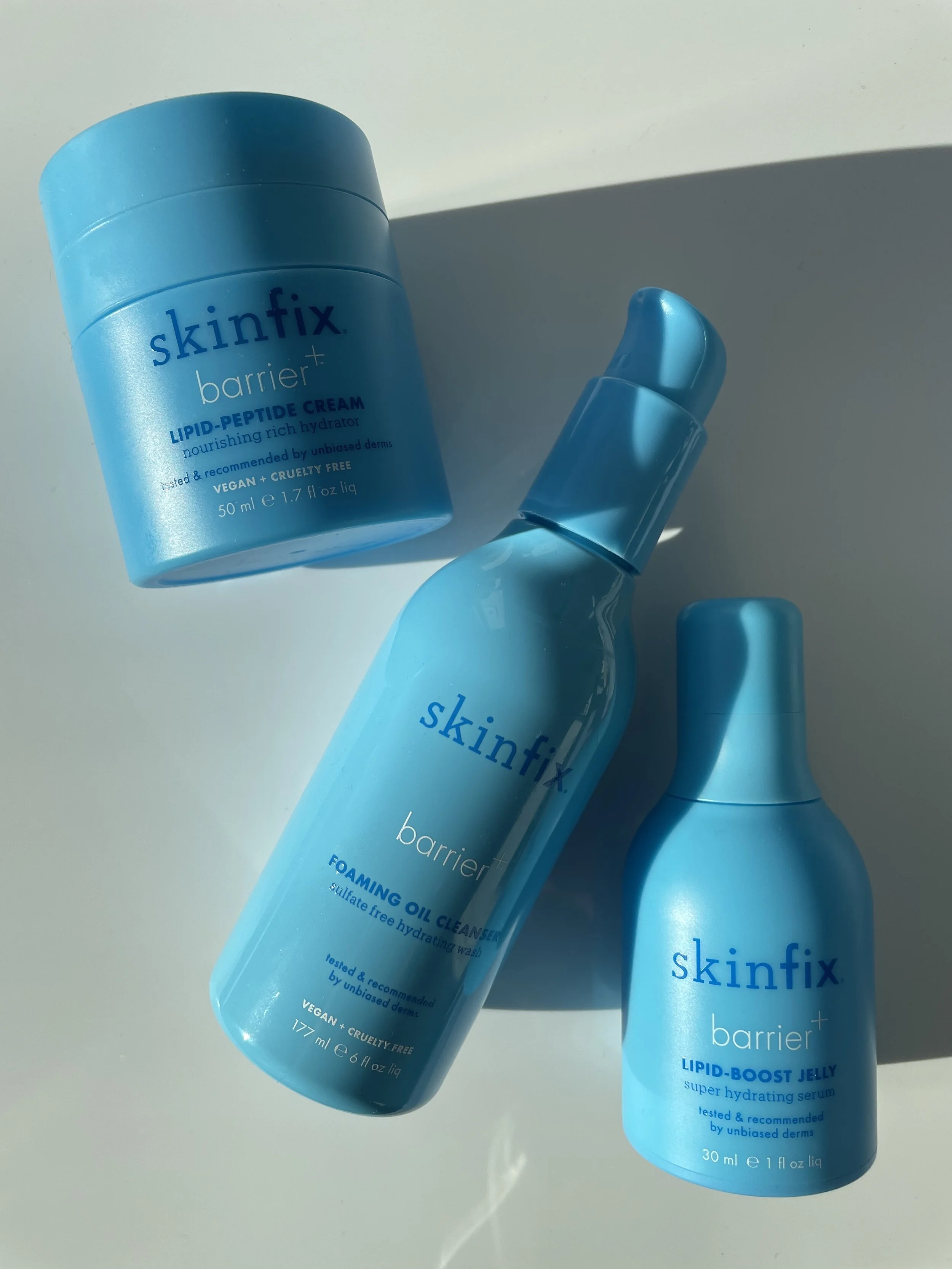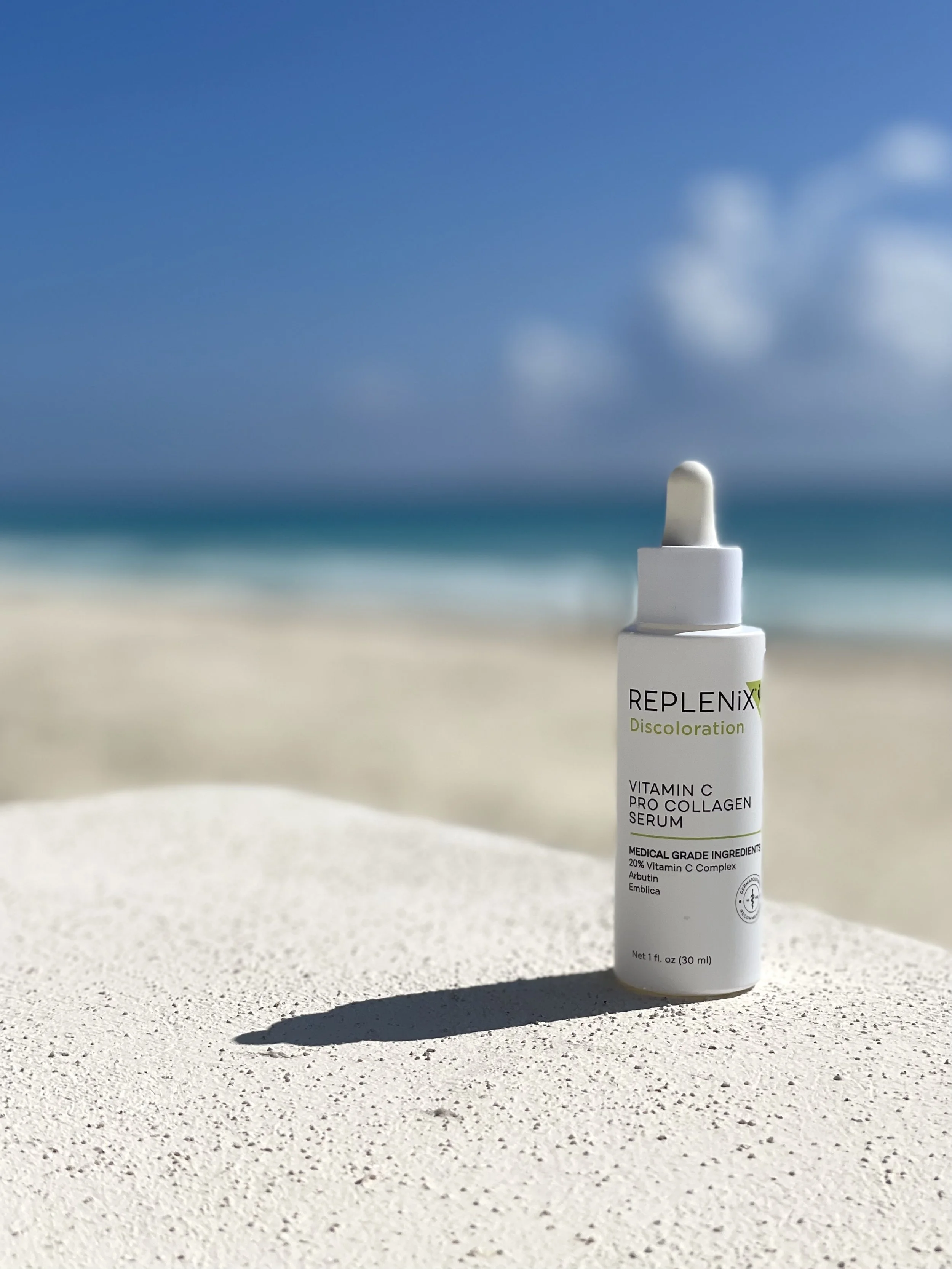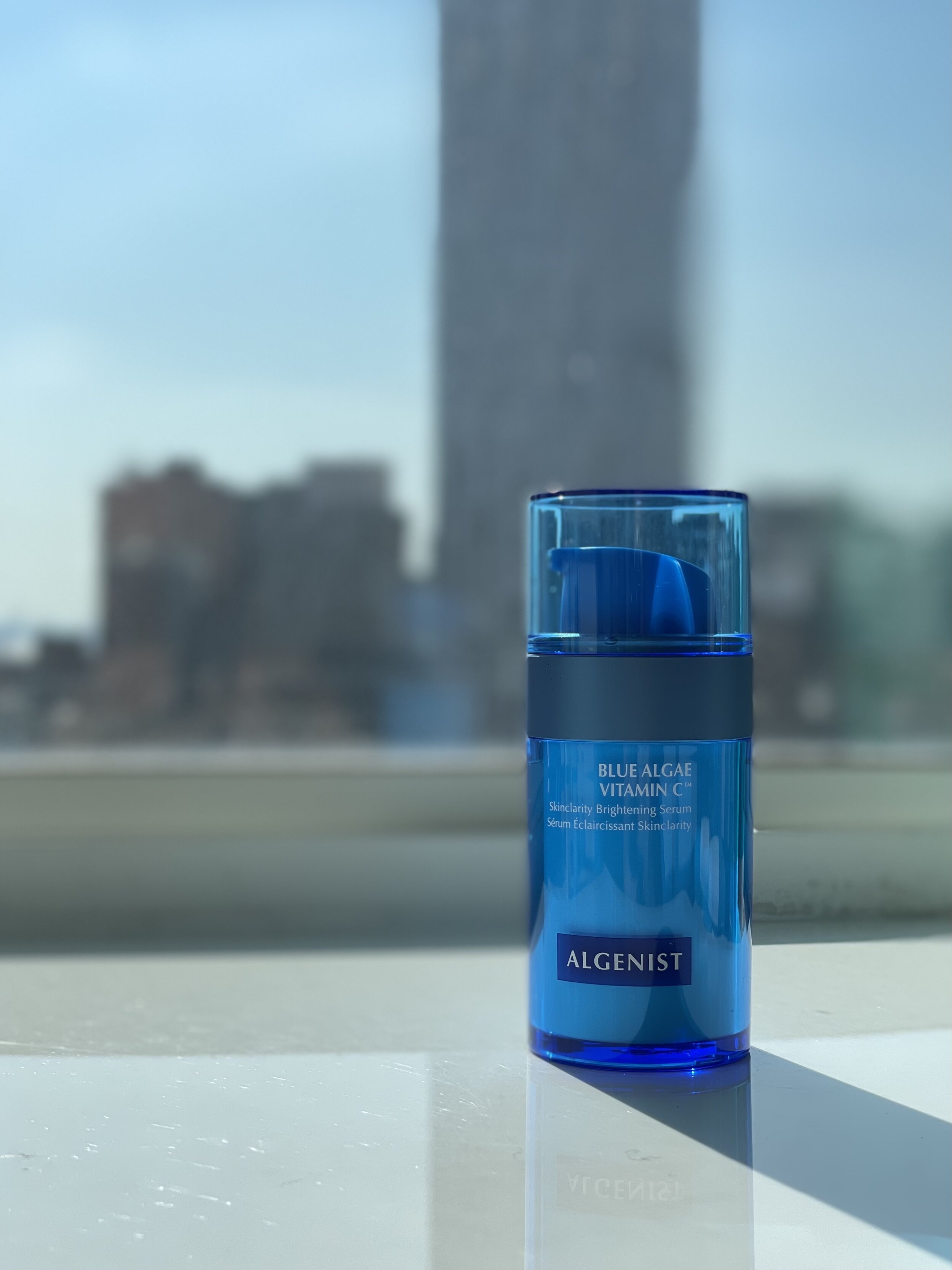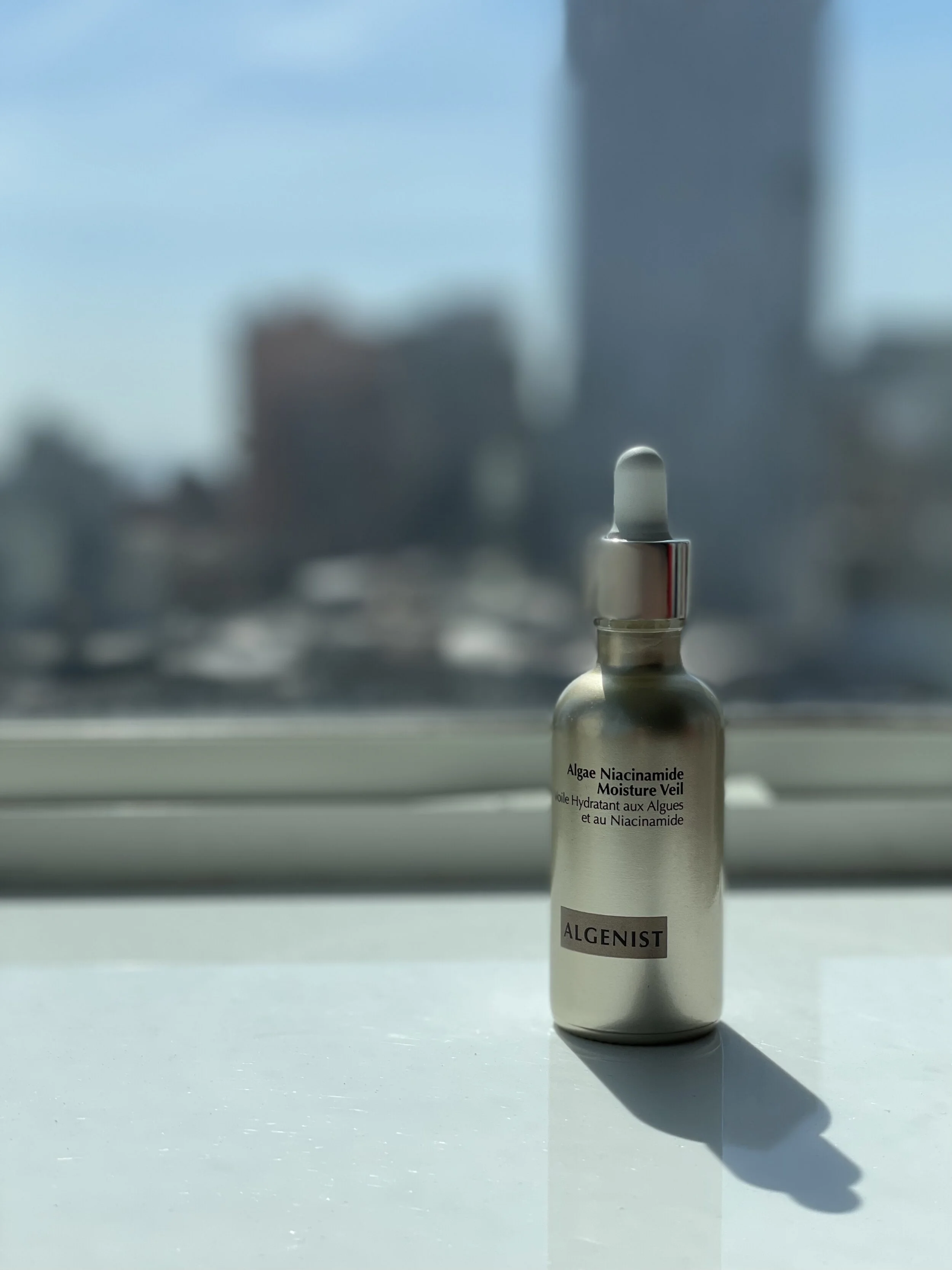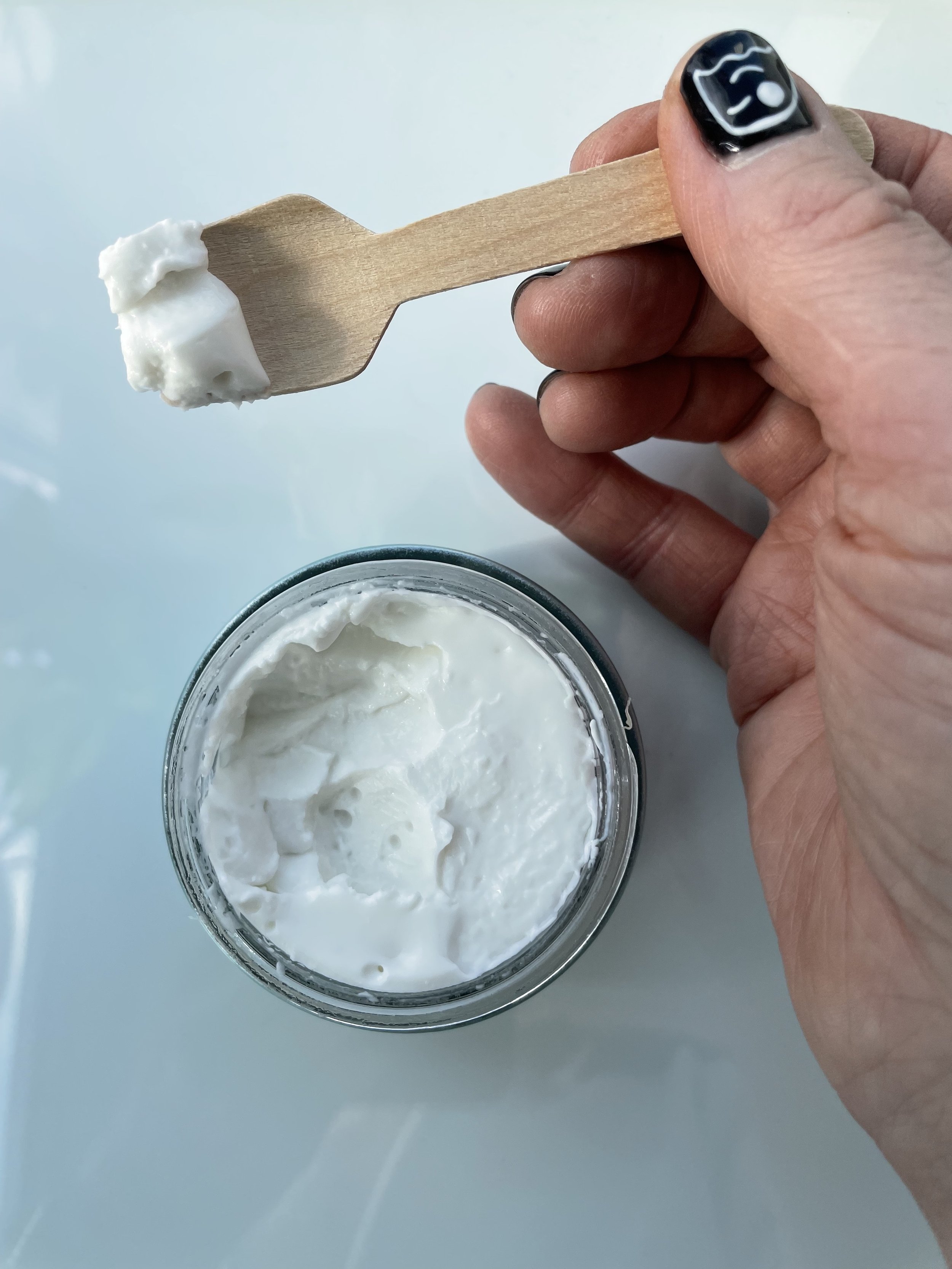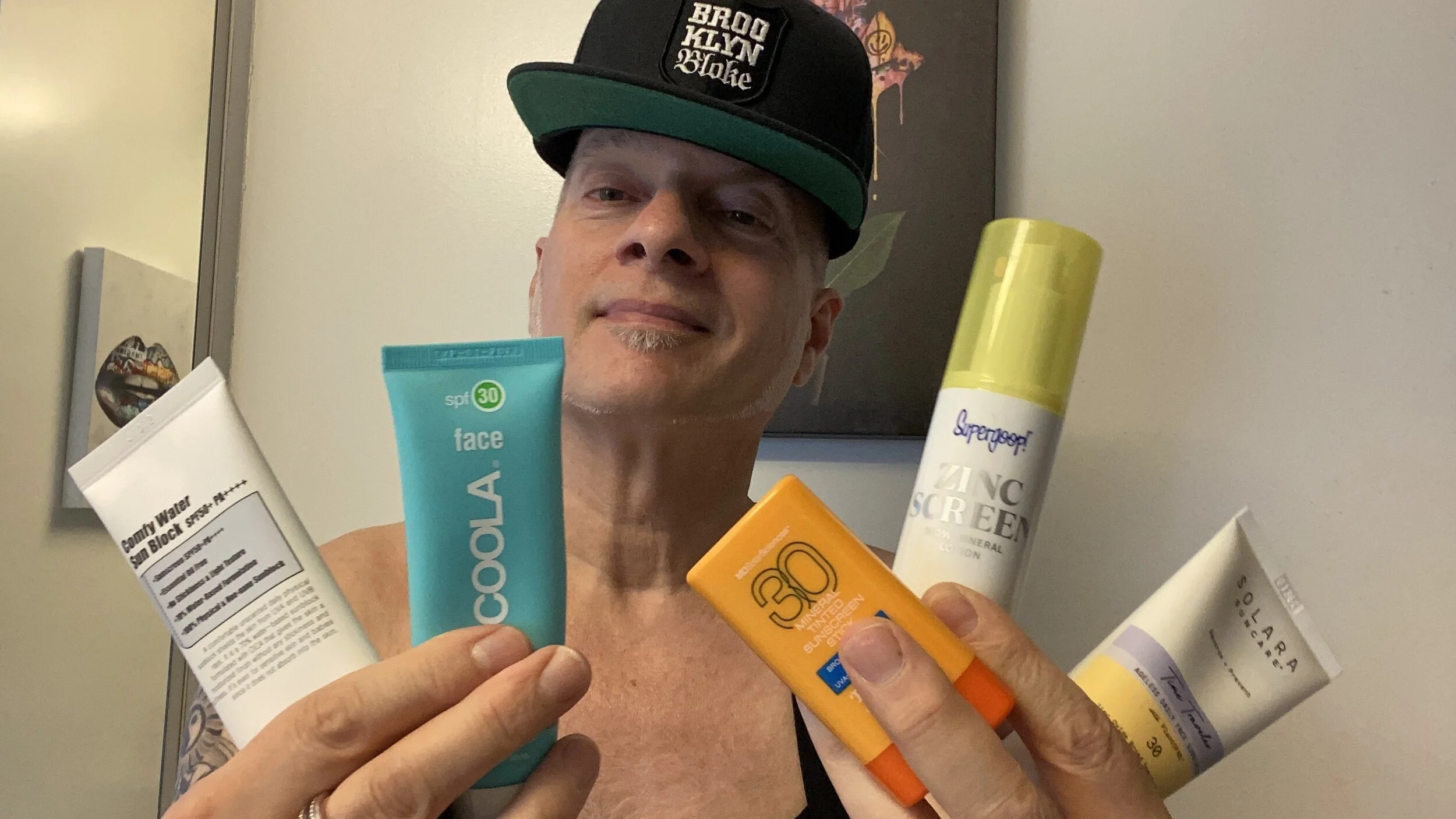PRODUCT REVIEW: ALGENIST ULTIMATE ANTI-AGING CREAM – BEST DRY SKIN MOISTURIZER, BEST FACE CREAM FOR DRY SKIN
ALGENIST | ULTIMATE ANTI-AGING CREAM
This product review was originally part of my blog article titled, Seasonal Skincare Transitioning: Moisturizers I Love that Make Me Excited for Cold Weather - Part Two – Best Moisturizer for Oily Skin, Best Face Creams for Dry Skin. You can catch the full piece here.
__
Last week, I kicked off my annual series on what I consider the best cold weather face creams for dry skin, oily skin and all skins in between. The article was titled, Seasonal Skincare Transitioning: Moisturizers I Love that Make Me Excited for Cold Weather - Part One. I invite you to check it out here.
While the four face creams I selected aren’t necessarily marketed for cold weather by the brand’s that offer them, my intent each year is to come up with the ideal collection of moisturizers that each skin type can use to maintain optimal skin health in the dry, low-humidity months between October and March. (At least those are the fall and winter months here in New York City.)
SEASONAL SKINCARE: MOISTURIZERS I LOVE THAT MAKE ME EXCITED FOR COLD WEATHER - PART ONE
My skin always feels like it’s under an invisible, insidious attack from the forces of cold air. If I don’t take extra care, like many people this time of year, the consequences of dry, dehydrated skin can be pretty extreme. Contrary to what skincare marketers promote, dehydration is the silent skin killer and one of the key causes of skin aging.
As I do each year, I think it’s super important to educate on the differences between dry skin and dehydrated skin…
What’s the Difference between Dry Skin and Dehydrated Skin?
Many people confuse the two. They’re not the same thing. Dry skin is a skin type. Dehydrated skin is a skin condition, just as being thirsty is a sign that your body is dehydrated. Dehydrated skin lacks water and any skin type, no matter its level of dryness or oiliness can be dehydrated.
In particular, dehydration is something that’s common to all of us in the cold as the low-humidity air around us draws water through the skin barrier and out of our skin. This process is referred to as trans-epidermal water loss, or TEWL. (More on TEWL in my review of the Skinfix Barrier+ Triple Lipid-Boost 360° Eye Cream below.)
As the cold weather kicks in, I think it’s helpful to understand the difference between dry skin and dehydrated skin in order to protect your skin health in the weeks ahead. For insights, I turned to the experts on the Paula’s Choice Research Team. There’s a superb piece on the Paula’s Choice site titled, What is Dehydrated Skin & How to Choose the Best Products.
Here is an excerpt:
Dehydrated skin often looks and feels like dry skin all over your face, but there's a major difference between the two: dehydrated skin is usually a temporary concern (with various surprising causes) and dry skin typically doesn't change over time. If you have dehydrated skin, your skin may also produce a normal or even excessive amount of oil on its surface.
"Dehydrated skin" is something we’re asked about frequently. It seems there’s a lot of confusion about what this skin concern is about. A major part of the confusion is that the term "dehydrated skin" is often used interchangeably with "dry skin" or "combination skin" but they are not the same! Dehydrated skin can occur in all skin types and is not exclusive to those with dry skin or combination skin.
The Difference Between Dry Skin and Dehydrated Skin
Having classically dry skin is easy to recognize. Dry skin frequently feels tight and dry, with no oil anywhere to be seen. This situation rarely fluctuates; skin feels dry all year long. The dryness might get worse depending on the climate, season, or activity, but regardless of those things, without great skin care products, the uncomfortable dry, tight feeling will persist.
As mentioned above, dehydrated skin can look and feel similar, but there’s a major difference: Dehydrated skin tends to come and go, it does not persist.
MY FAVORITE HUMECTANT SERUMS FROM PAULA'S CHOICE, THE INKEY LIST AND MORE - BEST HYALURONIC ACID SERUMS
The Skincarma “Lock and Block” Prevents Dehydration
To start, preventing dehydration in the first place requires drinking enough water. That differs for each of us based on our weight, the foods we eat, and the climate we live in. It’s even more important during colder periods.
A good rule is to drink one ounce of water each day for every pound of body weight. So, if you weigh 150 lbs., you’ll need to drink 150 ounces of water each and every day to keep your body and your skin optimally hydrated.
Then, employing skincare to treat and prevent dehydration requires what I refer to as a “lock and block” strategy.
It begins with a dedicated humectant serum applied to the skin in both your AM and PM routines that helps to lock water in. Follow with a moisturizer composed of a healthy balance of both humectants and oils to block and prevent the trans-epidermal water loss that can lead to dehydration.
WATCH MY VIDEO REVIEW OF
MY FAVORITE HUMECTANT SERUMS FROM PAULA'S CHOICE, THE INKEY LIST, GHOST DEMOCRACY AND MORE
ON MY YOUTUBE CHANNEL HERE
Last week, Part One in the series included one of my favorite cold weather face creams ever, the Skinfix Barrier+ Triple Lipid-Peptide Face Cream. With a real focus on skin barrier health, Skinfix is, in my opinion, one of the best clinical skincare brands.
And the brand’s Triple Lipid-Peptide Face Cream is simply among the best moisturizers for dry skin — and just about all skin types in winter except perhaps very oily and blemish prone.
I also included the Skinfix Barrier+ Triple Lipid-Boost 360° Eye Cream in my initial collection last week as the single eye cream recommendation. As I said, it’s a near-perfect eye cream that’s got everything the skin around the eyes needs, particularly during the harsh cold months of fall and winter.
MY WINTER SKIN SAVIOR: SKINFIX BARRIER+ LIPID REPLENISHING SKINCARE - BEST FACE CREAM FOR DRY SKIN
As I did in Part One, this week I’m selecting an additional four moisturizers and designating them for the unique skin type that I believe it’s best for — one in each of the main categories. In the product titles, you’ll see new call-outs for DRY SKIN, OILY / BLEMISH PRONE SKIN, SENSITIVE SKIN and ALL SKIN TYPES.
The Skinfix Triple Lipid-Peptide Cream, or TLPC as it’s known to fans, was my pick for dry skin. For oily and blemish prone skin, I was crazy excited to recommend the new Peace Out Repairing Moisturizer.
As with TLPC, the Peace Out Repairing Moisturizer is a terrific formula for protecting skin barrier health — not something you often see a focus of face creams for oily and blemish-prone skins. It’s such a smart, innovative formula.
PRODUCT REVIEW: PEACE OUT REPAIRING MOISTURIZER – BEST FACE CREAM FOR OILY SKIN AND BLEMISH PRONE SKIN
For sensitive skins, I selected the First Aid Beauty Ultra Repair Firming Collagen Cream — the brand’s richest moisturizer yet. First Aid Beauty is always my go-to for sensitive skins and the Ultra Repair Firming Collagen Cream is a superb face cream for dry, sensitive skin. I love its complex of proven skin soothers than can help to calm skin irritated by dry, cold air. That’s me in January!
Rounding out my Part One picks was my selection for all skin types — the Replenix Glycolic Acid 20% Resurfacing Cream. A brand created for skin professionals like dermatologists, Replenix is an unsung hero in the clinical skincare category.
And the brand’s Glycolic Acid 20% Resurfacing Cream is exceptional exfoliating face cream for all skins. With a 20% concentration of Glycolic Acid, the most powerful alpha hydroxy acid, it does so quite effectively. Surprisingly, it’s no where near as sensitizing as I expected it to be — even without a significant amount of soothing actives.
PRODUCT REVIEW: REPLENIX VITAMIN C PRO COLLAGEN SERUM - BEST VITAMIN C SERUM FOR DRY SKIN
As with the initial collection, the moisturizers I’ve selected for part two below all deliver that lock and block effect by locking hydration into the skin with humectants and blocking TEWL with effective levels of non-fragrant plant oils and/or lipids — essentially fats in the skin.
Today I’m presenting part two of my FW21 series on cold weather face creams, a collection that includes some of the best moisturizers for combatting dry, dehydrated skin — no matter the skin type.
For dry skin, the Algenist Genius Ultimate Anti-Aging Cream is a thick-whipped cream that just about needs a spoon to get out of the jar. Of course, I use a disposable wooden spatula but it almost seems like it’s not enough. The stuff is literally heaven for dry skin.
Speaking of heaven, Herbivore’s Aquarius Pore Purifying BHA Cream is just that for oily skin. Every time I open the jar, I expect a gel-cream and it’s just not. But that’s why I love it for oily skin in cold weather. It’s not oil-free, but it’s not heavy either. It’s got more oomph to it!
For sensitive skin, I have to go back to a classic. First Aid Beauty’s Ultra Repair Cream Intense Hydration is simply one of the best (if not the best!) moisturizer for sensitive skin. The Ultra Repair Cream is free of anything and everything that could irritate skin, and loaded with soothing actives that calm skin down when it does get irritated. It cocoons the skin in a comfortable moisture blanket.
Last, for all skin types, and for the delicate eye area is a pair of products from one of my favorite organic brands KORA Organics. The brand’s super cool, refillable Turmeric Glow Moisturizer is a treasure trove of natural ingredients, many of which are derived from organic farming.
As I said in my article on it, the Turmeric Glow Moisturizer a treasure trove of natural ingredients, many of which are derived from organic farming. And the new KORA Organics Berry Bright Vitamin C Eye Cream is an exceptional formula, loaded with hydrators and antioxidants — nearly perfect for the eye area.
Also new to this year’s blog articles, at the end of each review you’ll find a new section that breaks down what I like and don’t about the product as well as a deeper explanation of who I think it’s best for based on the formula make-up, texture and my own experience with it.
Let’s have a look at one of my FW21 face cream picks, which I consider ideal for cold weather…
BEST FOR DRY SKIN:
Algenist | Genius Ultimate Anti-Aging Cream
Over the course of 2021, I’ve reviewed several intriguing products from the San Francisco-based biotechnology company, Algenist. In fact, one of my favorite new brand crushes this year has been Algenist.
The original bio-science brand is constantly innovating by creating new ways to address old problems — like dull skin and hyperpigmentation. That means introducing new products and even inventing new ingredients.
There aren’t many brands out there that invent entirely new ingredients for their own formulations. Most skincare ingredients are purchased from the same ingredient manufacturers. Or they’re bundled with other existing ingredients and given a catchy complex name by brand marketers.
An example of Algenist’s unique innovation philosophy, the brand’s new Blue Algae Vitamin C Skinclarity Brightening Serum was made with an exclusive, patented form of pure Ascorbic Acid, one that Algenist invented and recreates in their labs. You can catch my review of this cool new Vitamin C serum here.
PRODUCT REVIEW: ALGENIST BLUE ALGAE VITAMIN C SKINCLARITY BRIGHTENING SERUM - BEST VITAMIN C SERUM
Another of the brand’s newest innovations is the Algae Niacinamide Moisture Veil — one of the best Niacinamide serums for oily skin and skin that’s prone to blemishes. Algenist’s new Niacinamide Moisture Veil is the first Niacinamide serum I’ve come across that’s formulated specifically to help regulate skin’s natural oil production over time. It achieves that with the brand’s proprietary algae extracts.
While The Ordinary’s Niacinamide 10% + Zinc 1% is popular with oily skin types, there’s no clinical evidence that zinc is actually beneficial for oily or acne prone skin. It may have a beneficial effect, but it doesn’t appear to be significant.
Algenist’s Algae Niacinamide Moisture Veil is infused with the brand’s proprietary Alguronic Acid as well as a “Sebum-Fighting Algae Concentrate” that’s proven to help minimize excess sebum on the skin surface to control shine. If you’re an oily skin type, this is your Niacinamide serum.
PRODUCT REVIEW: ALGENIST ALGAE NIACINAMIDE MOISTURE VEIL - BEST NIACINAMIDE SERUM FOR OILY SKIN
While Algenist’s Genius Ultimate Anti-Aging Cream isn’t as wildly innovative as the brand’s two newest products, it’s a wonderful moisturizer for dry skin — and especially in the colder months.
As I said, it has this surprisingly thick-whipped texture that seems like it needs a dessert spoon to get out of the jar.
Before I go any further, let me share once again that I am no fan of skincare products in jars. Jars are great for peanut butter and condiments, but not so great for skin care. A jar exposes the often vulnerable ingredients in the formula to light, oxidation and even bacteria from your fingertips if you’re not using a spatula to retrieve the product.
Not all skincare ingredients are hypersensitive to the elements. Antioxidant vitamins and botanicals are particularly vulnerable when exposed. If you’re relying on a skincare product for its antioxidant potency, a good rule is to use it up within a month.
That said, while the Algenist Genius Ultimate Anti-Aging Cream does contain several antioxidant botanical extracts that can help to defend skin against environmental damage, they’re not the best antioxidants and not at significant levels.
With its higher concentrations of vegan collagen, ceramides and non-fragrant plant oils like Shea Butter, the formula is more focused on skin replenishment. It’s a whole lot of goodness for dry skin in the low humidity air of the fall and winter months.
What Is Collagen in Skin and How Can I Rebuild Collagen in My Face?
There’s a concerted debate about whether or not collagen applied to the skin, as with the Algenist Genius Ultimate Anti-Aging Cream, has any effect the skin’s collagen content. Whether its vegan collagen or animal-derived collagen, the substance cannot readily penetrate the skin barrier, a tight mesh whose purpose is to keep anything from getting into the body.
In truth, the most effective way to boost collagen in your skin and restore its youthful plumpness is to regularly apply either a well-formulated Vitamin C serum and/or a Retinol treatment, AM and PM. At high concentrations, both Vitamin C and Vitamin A (Retinol is a derivative) are proven to stimulate skin’s collagen production over time to plump out the skin and diminish the appearance of lines and wrinkles in the complexion.
There’s a superb article on the important role collagen plays in the body and in the skin on the Healthline website titled, Collagen — What Is It and What Is It Good For?
An excerpt from the article:
Collagen is the most plentiful protein in your body.
It has various important roles, including providing structure to your skin and helping your blood clot.
In recent years, it has gained popularity as a nutritional supplement and ingredient in shampoos and body lotions.
Still, you may wonder what collagen is, as well as what it’s good for. This article gives you a thorough overview of this important protein.
What is collagen?
Collagen is the most abundant protein in your body, accounting for about one-third of its protein composition.
It’s one of the major building blocks of bones, skin, muscles, tendons, and ligaments. Collagen is also found in many other body parts, including blood vessels, corneas, and teeth.
You can think of it as the “glue” that holds all these things together. In fact, the word comes from the Greek word “kólla,” which means glue.
What does it do in your body?
There are at least 16 types of collagen. The four main types are type I, II, III, and IV (1Trusted Source).
Here’s a closer look at the four main types of collagen and their roles in your body:
Type I. This type accounts for 90% of your body’s collagen and is made of densely packed fibers. It provides structure to skin, bones, tendons, fibrous cartilage, connective tissue, and teeth.
Type II. This type is made of more loosely packed fibers and found in elastic cartilage, which cushions your joints.
Type III. This type supports the structure of muscles, organs, and arteries.
Type IV. This type helps with filtration and is found in the layers of your skin.
As you age, your body produces less and lower quality collagen.
One of the visible signs of this is in your skin, which becomes less firm and supple. Cartilage also weakens with age.
So what is the point of collagen in topical skincare if the collagen cannot penetrate the skin barrier far enough to replenish skin’s deleted collagen level? Well, it can function as a barrier against TEWL, helping to keep skin from dehydrating in the cold.
As rich as it is, Ultimate Anti-Aging Cream actually melts right into the skin. I used it just last night as the last step of my PM skincare routine and noticed that 30 minutes after applying it, the product had been nearly soaked up. For a product as dense as this is, I find that remarkable.
Of course, the Algenist Genius Ultimate Anti-Aging Cream is infused with the brand’s proprietary, patented Alguronic Acid. The sustainably produced algae extract is found in all of the brand’s products and has multiple benefits for the skin — and for the other actives in the formula.
Alguronic Acid is clinically proven to multiply the benefits of other ingredients and is a superb skin hydrator, which is welcome in the drier air. Regrettably, since the product comes in a jar, I wouldn’t bank on the antioxidant benefits of the algae extract.
The brand uses a high concentration of the microalgae oil to moisturize and soothe skin as well as prevent and repair dryness. It’s a superb formula for comforting dry skin.
WATCH MY VIDEO REVIEW OF
AMPING UP THE BRIGHTENING WITH ALGENIST FOR SELFCARE SUNDAY
ON MY YOUTUBE CHANNEL HERE
What I like about it: The Algenist Genius Ultimate Anti-Aging Cream is a terrific moisturizer and one of the best face creams for dry skin in the colder months. I love its powerful replenishment benefits and the fact that as rich as it is, it melts right in.
What I don’t like about it: I’m not a fan of products in jars. The fact that Algenist’s Genius Ultimate Anti-Aging Cream formula is exposed to the elements, means your skin won’t fully benefit from the brand’s patented Alguronic Acid.
Who it’s for: Dry skin types year round and especially during the low-humidity colder months of fall and winter.
SHOP THE BLOG: Purchase the Algenist Genius Ultimate Anti-Aging Cream for $139 here.
The Ingredient List of the Algenist Genius Ultimate Anti-Aging Cream:
 sii|h 0 0, Chlorella Protothecoides Oil emo, Dimethicone emo 0 1, Butylene Glycol h|solv|vc 0 1, Glyceryl Stearate emo|emu 0 1-2, PEG-100 Stearate surf|emu 0 0, Butyrospermum Parkii (Shea) Butter
sii|h 0 0, Chlorella Protothecoides Oil emo, Dimethicone emo 0 1, Butylene Glycol h|solv|vc 0 1, Glyceryl Stearate emo|emu 0 1-2, PEG-100 Stearate surf|emu 0 0, Butyrospermum Parkii (Shea) Butter  emo|vc, Pentylene Glycol solv|h, Potassium Cetyl Phosphate emu|surf, Parachlorella Beijerinckii Exopolysaccharides, Collagen
emo|vc, Pentylene Glycol solv|h, Potassium Cetyl Phosphate emu|surf, Parachlorella Beijerinckii Exopolysaccharides, Collagen  h, Ceramide NP
h, Ceramide NP  sii, Cynara Scolymus (Artichoke) Leaf Extract, Retinyl Palmitate cci 1-3 1-3, Astragalus Membranaceus Root Extract
sii, Cynara Scolymus (Artichoke) Leaf Extract, Retinyl Palmitate cci 1-3 1-3, Astragalus Membranaceus Root Extract  aox|emo, Atractylodes Macrocephala Root Extract, Iris Florentina Root Extract, Bupleurum Falcatum Root Extract, Copper Lysinate/Prolinate
aox|emo, Atractylodes Macrocephala Root Extract, Iris Florentina Root Extract, Bupleurum Falcatum Root Extract, Copper Lysinate/Prolinate  cci, Methylglucoside Phosphate
cci, Methylglucoside Phosphate  cci, Stearalkonium Bentonite vc|vc, Acrylates/C10-30 Alkyl Acrylate Crosspolymer vc, Silica vc, Caprylyl Glycol h|emo, Sodium Hydroxide buff, Disodium EDTA chel, Ethylhexylglycerin pres, Cetyl Alcohol emo|emu|vc|surf 2 2, Propylene Carbonate solv|vc, Quartz abrasive/scrub, Phenoxyethanol pres, Leuconostoc/Radish Root Ferment Filtrate amic|pres, Chlorphenesin pres|amic, Fragrance (Parfum)
cci, Stearalkonium Bentonite vc|vc, Acrylates/C10-30 Alkyl Acrylate Crosspolymer vc, Silica vc, Caprylyl Glycol h|emo, Sodium Hydroxide buff, Disodium EDTA chel, Ethylhexylglycerin pres, Cetyl Alcohol emo|emu|vc|surf 2 2, Propylene Carbonate solv|vc, Quartz abrasive/scrub, Phenoxyethanol pres, Leuconostoc/Radish Root Ferment Filtrate amic|pres, Chlorphenesin pres|amic, Fragrance (Parfum)  perf, Coumarin
perf, Coumarin  perf
perfWATCH MY VIDEO REVIEW OF
MY WINTER SKIN SAVIOR: SKINFIX BARRIER+ LIPID REPLENISHING SKINCARE
ON MY YOUTUBE CHANNEL HERE
WATCH MY VIDEO REVIEW
HOW’S YOUR MICROBIOME DOING? THE BEST WAY TO CHECK YOUR MICROBIOME HEALTH…
ON MY YOUTUBE CHANNEL HERE
WATCH MY VIDEO REVIEW
A COMPLETE K-BEAUTY ROUTINE WITH THE BEST FACIAL SKINCARE FROM PURITO, COSRX, MISSHA & MORE!
ON MY YOUTUBE CHANNEL HERE
WATCH MY VIDEO REVIEW
RETINOL, RETINOIDS, RETINOIC ACID PART ONE - THE BEST RETINOL FACE CREAMS & SERUMS
ON MY YOUTUBE CHANNEL HERE
WATCH MY VIDEO REVIEW OF
MY WINTER SKIN SAVIOR: SKINFIX BARRIER+ LIPID REPLENISHING SKINCARE
ON MY YOUTUBE CHANNEL HERE
SKINCARMA X HERBAL FACE FOOD EXCLUSIVE!
FOR A LIMITED TIME, SAVE 20% OFF HERBAL FACE FOOD!
Enter code SKINCARMA20 at checkout.
WATCH MY VIDEO REVIEW
THE YEAR’S BEST VITAMIN C SERUMS WITH THE ORDINARY, CLINIQUE, BEAUTY STAT & MORE!
ON MY YOUTUBE CHANNEL HERE
WATCH MY VIDEO REVIEW
AMPERNA PROBIOTIC SKINCARE AND TWO OF THE BEST ANTI-AGING SERUMS FOR SENSITIVE SKIN
ON MY YOUTUBE CHANNEL HERE
WATCH MY VIDEO REVIEW
MY #SELFCARESUNDAY ESSENTIALS WITH SKINFIX, HERBIVORE AND SELFLESS!
ON MY YOUTUBE CHANNEL HERE






